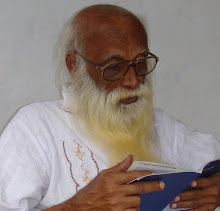Man, woman, Moksha.
Siva
and Parvati were hard at it, making love in a lovely forest. Alas, the great
sages headed by Sanaka chose just that moment to intrude, paying respects to
the Great God. Parvati, all undressed as she was, was shamed. The sages wisely
did not stay. Siva cursed: Anyone who enters this forest will immediately
become female!
The
king of the land at that time was handsome young Sudyumna, fond of his Sindhu
horse, and of hunting in the company of his hefty (male) companions. And they
entered that forest; immediately they became women, and even the horse became a
mare! Handsome Sudyumna became the lovely beauty, and adopted the name Ila.
Making the best of it, Ila and companions made a picnic of it in that
enchanting forest.
Budha,
son of Chandra by Tara the wife of Brhaspati, had grown up to be a god as
lovely to look at as his father. He fell in love with Ila, who too fancied him.
To them was born – the great Pururavas, who espoused the Apsara Urvasi, and
founded the Puru line of kings to which the Pandava and Kaurava brothers were
later to belong.
Great
sage Vasistha felt pity for Ila, who ought to be Sudyumna, the king. He prayed
to Siva, who blessed that Ila would be female one month, and male the next in
strict alternation! This made it impossible for him to return to his court, and
so, Vasistha worshipped the Almighty Mother Goddess of the Universe, more
powerful than all the gods, and more merciful that most women. She not only
granted the boon he desired, but also assured him that he would attain ultimate
bliss and release from the chain of rebirths.
And
so, Ila now become Sudyumna again, ruled only just so long as was required to
groom Pururavas to assume regnal responsibilities before merging himself in
ultimate MOKSHA in the Primordial Power.

5 comments:
I came across this different explanation about Ila & sudyamna - Pl check this link http://en.wikipedia.org/wiki/Ila_%28Hinduism%29
repeating the link again - Ila (Hinduism)
thank you very much. i had followed the Srimad Devi Bhagavatam version. of course, i had condensed it a very great deal!
hindu mythology is a miscellaneous compendium. each version is part of a specific line of propaganda. I liked the Devi Bhagavatam because it pinpoints the sex-change aspect.
quite interesting...actually some of these posts answers my curiosity on different mythical characters like surya & chandra, aswini devas etc..keep posting sir..it would be nice if the text from which these interpretations are taken is quoted along with the posts
thank you, sri pradeep. i agree that i should cite the texts i had depended on. i shall do so from the next post onwards. regards, tmm
Post a Comment